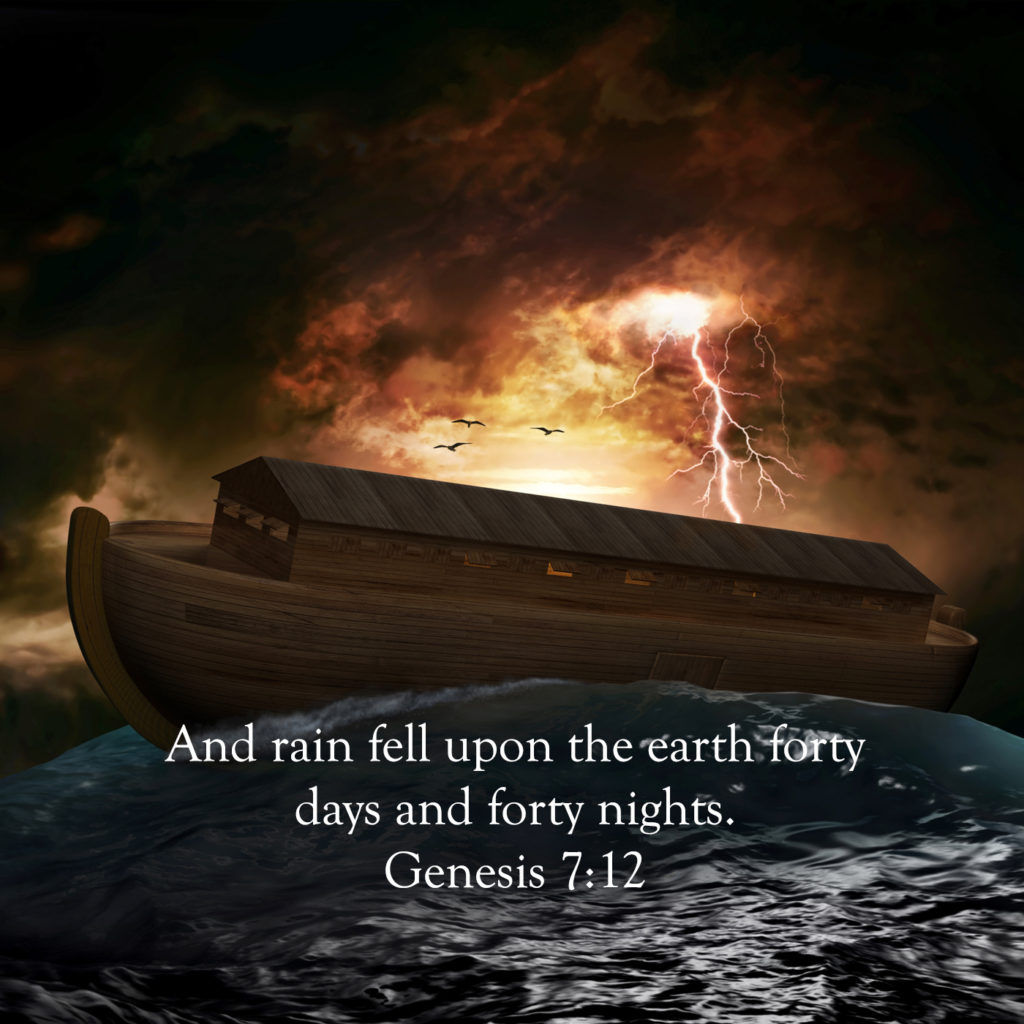
1 Then the LORD said to Noah, “Go into the ark, you and all your household, for I have seen that you are righteous before me in this generation.
After Noah completes the ark, as per God’s instructions, God then commands Noah and his family to enter the ark.
2 Take with you seven pairs of all clean animals, the male and his mate, and a pair of the animals that are not clean, the male and his mate, 3 and seven pairs of the birds of the heavens also, male and female, to keep their offspring alive on the face of all the earth.
God also adds to his previous command to take a pair of every animal to include seven pairs (a total of 14 individuals) of the “clean” animals (deer, sheep, and bovine type animals) as well as birds. Some of these will help repopulate the earth, some will be offered as a sacrifice, and some of them will likely be eaten.
4 For in seven days I will send rain on the earth forty days and forty nights, and every living thing that I have made I will blot out from the face of the ground.”
God give Noah a week to finish preparing the ark and gathering animals and supplies. He then gives Noah a basic explanation of what is going to happen, he is going to send rain. Now some scholars suggest that before this point, it might not have ever rained, but rather the earth was watered by a mist, as described in Genesis 2. If that is the case Noah would really have no idea what God was talking about, and would have waited until something unusual happened, such as water falling from the sky, to know when God’s judgement was coming.
5 And Noah did all that the LORD had commanded him.
Again, Noah listens to and obeys God without question.
6 Noah was six hundred years old when the flood of waters came upon the earth.
When the text first mentions Noah he is 500 years old. Now one hundred years later, he completes the ark and prepares for the flood. With that in mind, many people suggest it took Noah nearly 100 years to build the ark.
7 And Noah and his sons and his wife and his sons’ wives with him went into the ark to escape the waters of the flood. 8 Of clean animals, and of animals that are not clean, and of birds, and of everything that creeps on the ground, 9 two and two, male and female, went into the ark with Noah, as God had commanded Noah.
Noah takes all of the animals on the ark “two and two.” He is not forgetting about taking the seven pairs of clean animals and birds, rather the text skips over this detail that was explained earlier, assuming that the seven pairs of clean animals and birds were included, as “Noah did all that the LORD had commanded him.”
10 And after seven days the waters of the flood came upon the earth.
Just as God told Noah, the flood came one week later.
11 In the six hundredth year of Noah’s life, in the second month, on the seventeenth day of the month, on that day all the fountains of the great deep burst forth, and the windows of the heavens were opened.
The text records with extreme detail the date of the beginning of the flood. Very few other events in the Bible are recorded with such precision. This detail suggests that the flood narrative is a historical account, and not a work of fiction.
In addition the beginning of the flood is described in two parts: The bursting of the deep, and the opening of the heavens. The understanding is that much of the water that was underground, sometimes escaping as a “mist” (Genesis 2) burst through the surface of the earth, violently, like a massive geyser, while, perhaps for the first time, rain came down from the sky in a deluge. The combination of both ground water flooding and flooding by rain would have certainly been cataclysmic.
12 And rain fell upon the earth forty days and forty nights.
The rain fell for exactly as long as God said it would.
13 On the very same day Noah and his sons, Shem and Ham and Japheth, and Noah’s wife and the three wives of his sons with them entered the ark, 14 they and every beast, according to its kind, and all the livestock according to their kinds, and every creeping thing that creeps on the earth, according to its kind, and every bird, according to its kind, every winged creature. 15 They went into the ark with Noah, two and two of all flesh in which there was the breath of life.
“On the same day” suggest that this massive entering into the ark started as the rain was coming down. However it likely wasn’t a mad rush. Many of the animals would have been settled into the ark during the seven days prior. There may have still been a few animals waiting in line, and they entered the ark with Noah and his family as the rain started.
16 And those that entered, male and female of all flesh, went in as God had commanded him. And the LORD shut him in.
God himself closes the door of the ark. He seals them in and protects them from the flood. At the same time this act of mercy toward Noah’s family was an act of judgement toward the rest of the world. Anything or anyone not on the ark would perish.
17 The flood continued forty days on the earth. The waters increased and bore up the ark, and it rose high above the earth. 18 The waters prevailed and increased greatly on the earth, and the ark floated on the face of the waters.
As the waters rise they lift the ark off of the ground, this suggests that rather than being a true box, the Ark was probably shaped like a boat, and thus could easily float on top of the waters.
19 And the waters prevailed so mightily on the earth that all the high mountains under the whole heaven were covered. 20 The waters prevailed above the mountains, covering them fifteen cubits deep.
Fifteen cubits is roughly 25 feet. The flood contained so much water as to cover the “high mountains” with over 20 feet of water. Even if the assumption that mountains were not as tall before the flood is true, we are still looking at depths over 20,000 feet (nearly 4 miles) deep.
This passage is often cited as an explanation that the flood was, in fact, a global flood and not a local one, as many secular scholars suggest. While the geological evidence may seem inconclusive as to whether or no the flood covered the entire earth, anthropological studies suggest that the flood may have been a global phenomenon, as every people group on the face of the earth has a “flood narrative” in their mythology.
From a Biblical perspective, it does not make sense for God to only judge a partial area of the world with the flood, and risk have those He is judging escape to higher ground. The Bible is clear that the flood was a global phenomenon.
21 And all flesh died that moved on the earth, birds, livestock, beasts, all swarming creatures that swarm on the earth, and all mankind. 22 Everything on the dry land in whose nostrils was the breath of life died. 23 He blotted out every living thing that was on the face of the ground, man and animals and creeping things and birds of the heavens. They were blotted out from the earth. Only Noah was left, and those who were with him in the ark.
The destruction of life on earth was total. Nothing that breathed air survived, save for those that were on the ark. God’s judgement was complete.
24 And the waters prevailed on the earth 150 days.
These 150 days includes the 40 days of rain, and begins the long process of drying and abating waters. At the end of the 150 days the Ark will come to rest on a mountain, however it will be many more months before the waters have subsided enough to leave the ark.
The obvious question is what happened to all of that water? It could not have all dried up, could it? Probably not, however, it doesn’t have to, the weight of the water would have cause some lower parts of the earth to sink deeper, and the higher parts of the earth to be pushed upward as a result, forming both the oceans and the continents at the same time.
